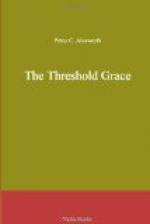So then, amid the manifold uncertainties of human life and the ever-changing forms and complexions of human experience, one thing is pledged beyond all doubt to every man who seeks the will of God and the promise for the safeguarding of his soul. He may write this at the top of every page in the book of life. He may take it for his light in dark days, his comfort in sad days, his treasure in empty days. He may have it on his lips in the hour of battle and in his heart in the day of disappointment. He may meet his temptations with it, interpret his sufferings with it, build his ideal with it. And it shall come to pass that he shall learn to look with untroubled eyes upon the outward things of life, nor fear the touch of its thousand grasping hands, knowing that his soul is in the hands of One who can keep it safe in all the world’s despite, even God Himself.
VI.
A PLEA FOR TEARS
They that sow in tears shall reap in joy.
He that goeth forth and weepeth, bearing
precious seed,
Shall doubtless come again with rejoicing,
Bringing his sheaves with him.
Ps. cxxvi. 5, 6.
It is almost impossible to recall the joys and sorrows of life without having some thought of their compensative relation. We set our bright days against our dark days. We weigh our successes against our failures. When the hour through which we are living is whispering a bitter message, we recall the kindlier messages of other hours and say that we have much for which we ought to be thankful. And such a deliberate handling of experience, such a quiet adjustment of memories, is not without its uses. Any view of life that will save a man from whining is worth taking. Any reckoning that will prevent a man from indulging in self-pity—that subtlety of selfishness—is worth making. There is, moreover, something very simple and obvious in this way of thinking and judging. To make one kind of experience deal with another kind, to set the days and the hours in battle array—or shall we say to arrange a tourney where some gaily-caparisoned and well-mounted Yesterday is set to tilt with a black-visored and silent To-day—is a way of dealing with life which seems to have much to commend it. But it has at the best serious limitations, and at the worst it may issue in a tragedy. The wrong knight may be unhorsed. The award may go to him of the black plume. Pitting one experience against another has gone to the making of many a cynic and not a few despairing souls. The compensative interpretation of joy and sorrow may bring an answer of peace to a man’s soul, or it may not. But in this matter we are dealing with things in which we cannot afford to risk an equivocal or a despairing answer. We must win in every encounter. It is not an hour’s joy, but a life’s outlook that is at stake. No hour’s fight was ever worth fighting if it was fought for the sake of the hour. The moments are ever challenging the eternal, the swift and busy hours fling their gauntlets at the feet of the ageless things. The real battle of life is never between yesterday and to-day; it is always between to-day and the Forever.




